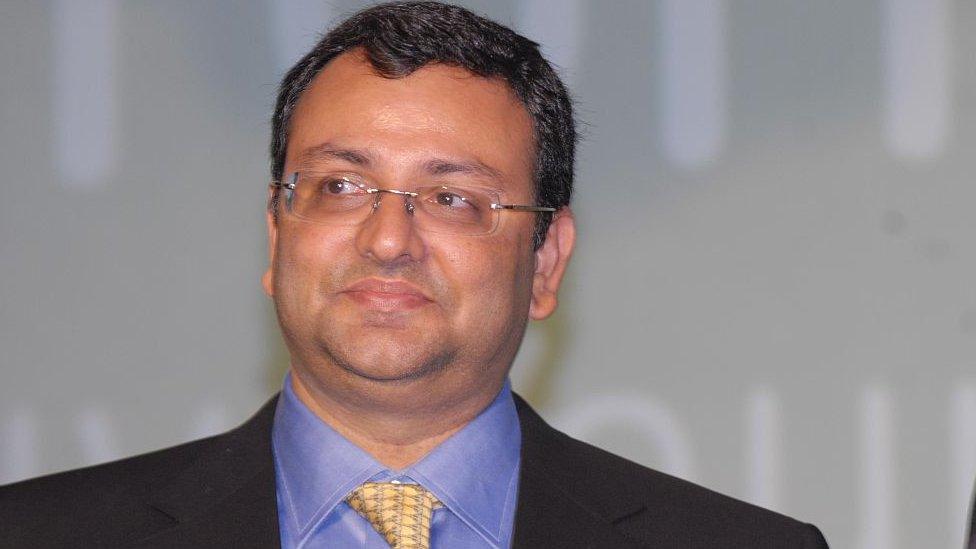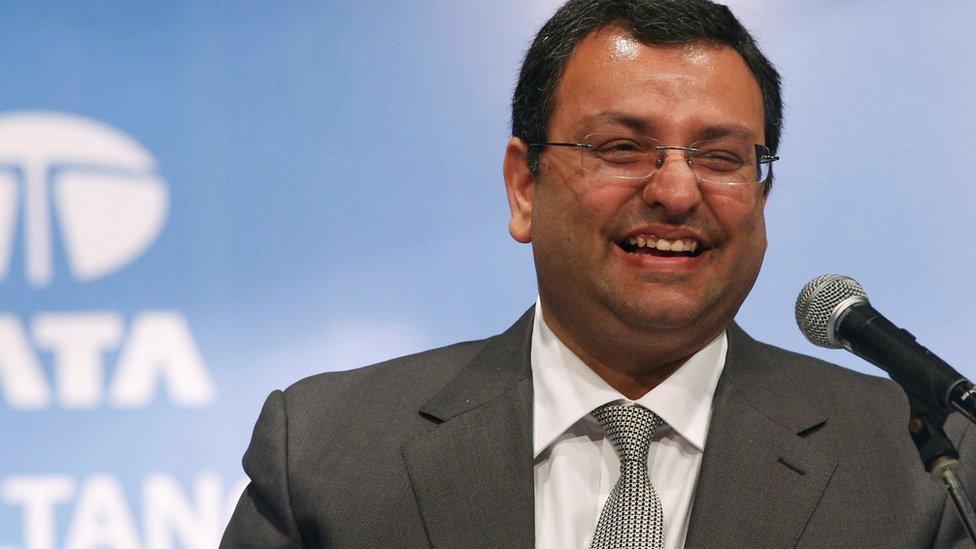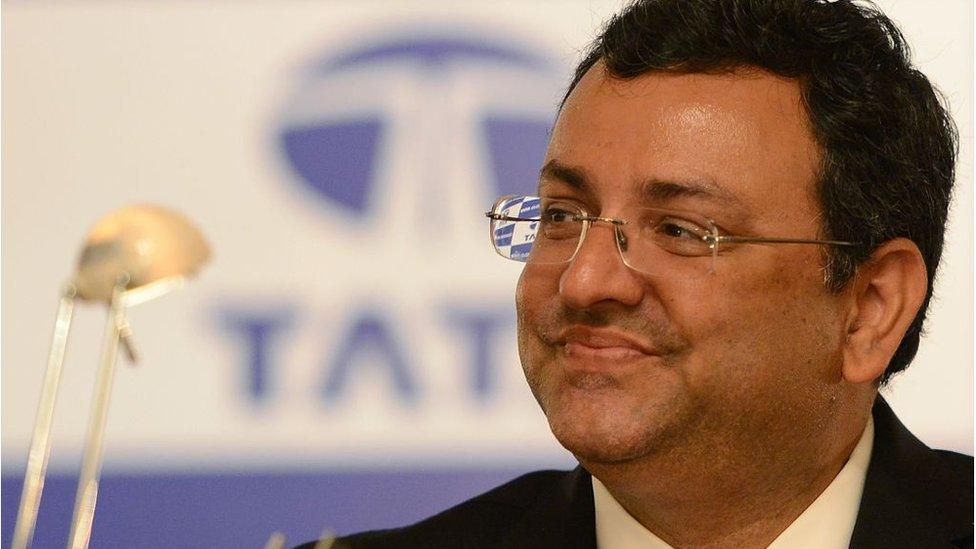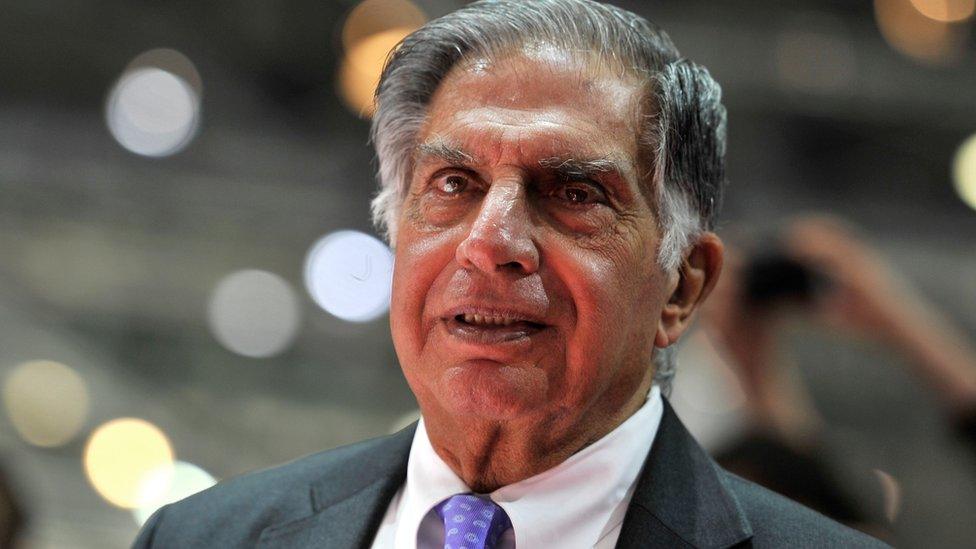Cyrus Mistry: Remembering former Tata Sons chairman who died in car crash
- Published

Cyrus Mistry died in a road accident on Sunday
Tributes have poured in for Cyrus Mistry, the billionaire former chairman of India's biggest conglomerate Tata, who died in a car crash on Sunday.
Mistry, 54, was ousted from Tata in 2016 in a boardroom coup that sparked a long and bitter legal battle.
The dispute made global headlines, but Mistry was no stranger to the spotlight even before his Tata stint.
His family founded and ran construction behemoth Shapoorji Pallonji group.
While the group had been struggling with debt in recent years, it is still one of India's largest construction firms.
In April, it said it had repaid lenders and exited a one-time debt restructuring plan that was implemented last year.
This is the second tragedy to hit the Mistry family in just four months - Cyrus Mistry's father Pallonji Mistry had died in June at the age of 93.
Indian Prime Minister Narendra Modi called Mistry's sudden death "a big loss to the world of commerce and industry".
"He was a promising business leader who believed in India's economic prowess," he tweeted.
Several other ministers and political leaders also tweeted their condolences to Mistry's family.
Union minister Smriti Irani called Mistry a "gentle soul; a man with a vision and a mission".
Allow X content?
This article contains content provided by X. We ask for your permission before anything is loaded, as they may be using cookies and other technologies. You may want to read X’s cookie policy, external and privacy policy, external before accepting. To view this content choose ‘accept and continue’.

Several state chief ministers and opposition leaders also expressed their shock and sadness.
Rahul Gandhi, leader of the opposition Congress party, said Mistry was among "the brightest business minds of the country, who made a significant contribution to India's growth story".
India's biggest business leaders also paid tribute to their peer.
Gautam Adani, Asia's richest man, called Mistry "one of the finest gentleman" he knew.
Allow X content?
This article contains content provided by X. We ask for your permission before anything is loaded, as they may be using cookies and other technologies. You may want to read X’s cookie policy, external and privacy policy, external before accepting. To view this content choose ‘accept and continue’.

Anand Mahindra, chairman of the Mahindra group, said the news was "hard to digest".
"I got to know Cyrus well during his all-too-brief tenure as the head of the House of Tata. I was convinced he was destined for greatness. If life had other plans for him, so be it, but life itself should not have been snatched away from him," he wrote on Twitter.
On Monday morning, Mr Mahindra also tweeted that he was resolving to "always wear [his] seat belt even when in the rear seat of a car" after news reports said that Mistry and a co-passenger who was with him in the back seat weren't wearing seatbelts - both died in the crash, while the two people in the front are in hospital with injuries.
While Mistry's ouster from Tata sparked a major corporate feud, his former colleagues at the group also remembered him with love and affection.
In a statement, Tata Consultancy Services (TCS) - part of the Tata group - called Mistry a "warm, friendly, and congenial person who built a strong relationship with the TCS family during his time as the Chairman of the company".
N Chandrasekaran, who is the current chairman of Tata Sons, said he was "deeply saddened" by Mistry's death.
"He had a passion for life and it is really tragic that he passed away at such a young age," he said.
Mistry, who graduated from the London Business School, was the youngest son of construction baron Pallonji Shapoorji Mistry. He was often described by friends and colleagues as a soft spoken and candid person.
He was known to enjoy playing golf and was a prolific reader.

'No one had a bad word to say about him'
Arunoday Mukharji, India Business Correspondent, BBC News
"Grateful for the opportunity - my conscience is clear."
That was how Mistry signed off in 2021 from a bitter legal battle with Tata Sons that had consumed his life for the past five years. India's top court had ruled in the Tata group's favour - but the boardroom coup and the reasons for it remain shrouded in mystery.
When Mistry took over as the chairman of Tata Sons in 2012, he became only the second non-Tata top boss of the firm. He was seen as a young leader looking to bring about change in India's largest conglomerate.
Assuming office when a generation of Tata leaders were retiring, Mistry often said his aim was to establish a governance structure that would promote accountability.
"He enjoyed tremendous goodwill at Bombay House [the Tata headquarters]. No one had an unkind word to say about Cyrus Mistry," says Amit Tandon, who runs a corporate advisory firm.
But the changes he tried to make, some analysts feel, may have not gone down well with the old guard at the firm, eroding support for Mistry. What everyone agrees on, however, is that the situation could have been handled better. Mistry accused the company of mismanagement and oppressing minority stakeholders. Tata Sons, in turn, alleged that he spoke out in public only after he was removed from the post, and didn't make the changes he needed to while leading the company.
The ensuing feud was so acrimonious that in 2020, the Shapoorji Pallonji group - run by Mistry's family - said it was starting the process of ending its 70-year long association with the Tata Group with a "heavy heart". Now analysts are watching to see how Mistry's sudden death will affect his family group, which was just emerging from a shadow cast by heavy debt in the past few years.

Related topics
- Published4 September 2022

- Published26 October 2016

- Published31 October 2016
